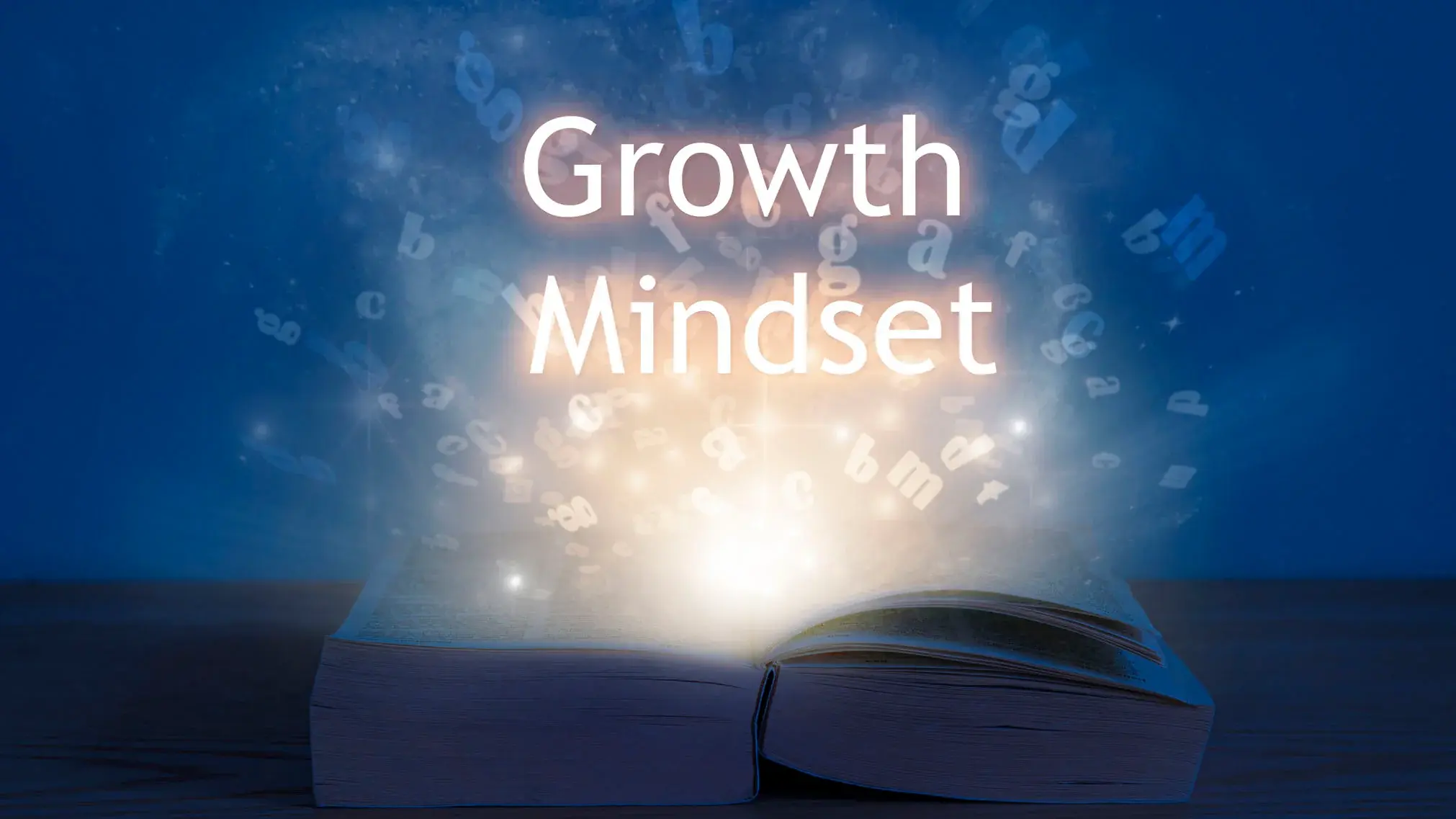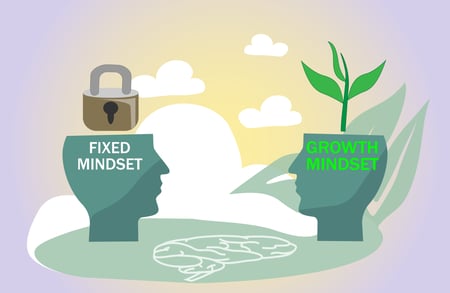5 min read
Growth Mindset: A Positive Way of Thinking
By: Nicole Thompson on Aug 23, 2021 7:45:00 AM

Today, more than ever, we are trying to stay positive. We are striving to persevere through constant adjustments to lifestyles, schooling, and social gatherings. We are worried about our decisions, if we're making the best ones, if we're doing the right things.
And although we do not know the long-term physical and mental effects of our current situations, we can still open our minds to think in a way to help ourselves, as well as our families, children, and students, find passion and persevere toward achieving goals.
Growth vs. Fixed Mindsets
A mindset is an attitude toward something or someone. American psychologist Carol Dweck, author of Mindset: The New Psychology of Success, established the growth mindset theory, which is the belief that "your basic qualities are things you can cultivate through your efforts" (8).
Conversely, a fixed mindset is the belief that "your qualities are carved in stone," meaning your intelligence and potential are already predetermined (Dweck 7). With a growth mindset, you work to improve and succeed through learning from mistakes and applying constructive feedback.
By changing mindsets, you alter the way you look at failure. By acknowledging the way you react to failure, you can begin to improve struggles and challenges with positivity and perseverance. This strategy works extremely well in the classroom, but it's effective for anyone, regardless of age. Remember, we are always capable of learning and growing as individuals.

What's Your Current Mindset?
To see if you have a growth mindset already, ask yourself the following questions.
- Do you believe intelligence can be changed?
- Can musical and athletic talent be learned by anyone?
- Are people capable of changing?
- Can you become proficient at something with practice?
- Can you develop skills without natural talent?
- Can you learn new skills at any age?
- Do people who have natural talent still need to practice and work hard?
- Can you change the basic traits of who you are?
If you answered yes to many or all of these questions, you have a growth mindset established. Your mindset is fluid and continues to grow, adapt, and change.
For context, some sports require more mental than physical stamina. To be successful physically, your mind has to be in the right place to accomplish the challenge. An optimistic, realistic, and dedicated mindset for weight loss, for instance, is a key factor to being successful in meeting and maintaining fitness and health goals. Many people would agree that if you aren't mentally in the right headspace, doing anything difficult feels nearly impossible.
Reframing
Reframing is a strategy that requires you to take comments you may typically hear or even use and rephrase them into a growth perspective. For example, instead of saying, "You really need to work on your math skills." You can say this: "These math concepts are challenging, but mistakes help you learn. Let's pick out our favorite mistakes and work through them together."
On the other side, think of ways to praise for a job well done. Instead of saying, "Wow, you did so well and didn't even need to try at all!" Say something like this: Your hard work is really paying off. You were able to solve all of these problems on your own."
Praising effort and the process versus natural intelligence will help children overcome setbacks when something does not come naturally to them.

Passion vs. Perseverance
With a growth mindset, passion and perseverance go hand in hand. It's hard to persevere without passion. However, you may not always feel passionate when you need to persevere.
American Academic Psychologist Angela Duckworth, author of Grit: The Power of Passion and Perseverance, believes that a combination of passion and perseverance equals grit. Grit determines how likely you are to reach a goal and continue to overcome challenges.
In fact, talent and grit are not directly related. A person can be gifted intellectually but end up leaving an eight-year doctoral program in medicine because the intensity and dedication required are too demanding. Earning a Ph.D. requires significantly more grit than a two- or even a four-year degree.
In any challenge, work ethic will lead to more success than sheer intelligence. Your tenacity to accomplish a goal is fueled by grit.
Academic Tenacity
People are often tenacious about activities they enjoy doing, such as hiking, painting, and making music. For many people, academic tenacity is not likely to be at the top of the list; obtaining a quality education from preschool through high school and even college is not for leisure. However, having tenacity for academics helps students learn and grow long-term.
Academic Tenacity: Mindsets and Skills that Promote Long-Term Learning, written by Carol Dweck, Gregory Walton, and Geoffrey Cohen, discusses how mindset affects academic performance long-term:
At its most basic level, academic tenacity is about working hard, and working smart, for a long time. More specifically, academic tenacity is about the mindsets and skills that allow students to:
-
- look beyond short-term concerns to longer-term or higher-order goals, and
- withstand challenges and setbacks to persevere toward these goals. (5)
Academic tenacity requires that grit (passion and perseverance) and a growth mindset to recognize and accept failure, to learn from mistakes, to set and achieve goals, and to build self-confidence.

Recognizing that you have fixed ideas and are willing to change them is the first step in adopting a growth mindset. Whether you want to work on your personal mindset, those of your children, or those of your students, consider how you process situations and ways you can promote growth positively.
No matter who you are, practicing a growth mindset will help you look at life, success, and challenges differently—with a little more hope and a little more optimism.
Sources
Duckworth, Angela. Grit: The Power of Passion and Perseverance. Scribner, 2016.
Dweck, Carol. Mindset: The New Psychology of Success. Random House, 2006.
Dweck, Carol, et. al. Academic Tenacity: Mindsets and Skills that Promote Long-Term Learning. Bill & Melinda Gates Foundation, 2014.
"Reframing for a Growth Mindset." PERTS, 2021, www.perts.net.
 Nicole Thompson is a contributing writer and editor to the Lincoln Learning blog. She brings more than a decade of experience in education, curriculum, and communications to her blogs. She has a Bachelor of Arts in Communications and a Master of Science in Instructional Leadership, with certifications in secondary English and Communications. Nicole is married with four children and has a spunky golden retriever named Cinder and a rescue dog named Annie Banannie.
Nicole Thompson is a contributing writer and editor to the Lincoln Learning blog. She brings more than a decade of experience in education, curriculum, and communications to her blogs. She has a Bachelor of Arts in Communications and a Master of Science in Instructional Leadership, with certifications in secondary English and Communications. Nicole is married with four children and has a spunky golden retriever named Cinder and a rescue dog named Annie Banannie.
Related Posts
How Do Honors Courses Fuel Intellectual Growth?
When middle school students move to high school, they encounter a wide range of academic choices...
Dig into Learning
Fourth graders at Hopewell Elementary School in Hopewell Township are getting their hands dirty as...
Support a Growth Mindset
Growth mindset is the belief that students can learn more or become smarter if they work hard and...